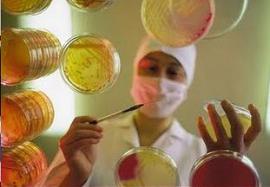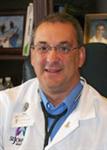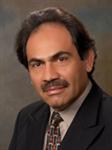Depending on the nature of the studied pathogenic microorganisms, Medical Microbiology divided into:
- Bacteriology (studying pathogenic bacteria)
- Virology (the study of viruses)
- Mycology (studying human pathogenic fungi)
- Protozoology (studying pathogenic unicellular organisms)
- Immunology (the study of the mechanisms of defense against pathogenic and non-pathogenic agents)
- Sanitary microbiology (studying the microflora of the environment and its impact on man)
- Clinical Microbiology (studies the role of opportunistic pathogens in human pathology)
- Pharmaceutical microbiology (studies the spoilage medicinal raw materials and plants under the influence of microbes, semination of dosage forms, etc.)
- Space Microbiology (studies microflora of outer space, and others planets)
- Technical Microbiology - develops technology the production from a microorganisms of various products for a national economy and medicine (antibiotics, vaccines, enzymes, proteins, vitamins).
Tasks of the Medical Microbiology
The main tasks of Medical Microbiology is:
- A thorough study of certain types of microorganisms, as well as human diseases caused by harmful microorganisms.
- Study of pathogenic microorganisms that give rise to tumors in an organism
- Study of the mechanisms of formation acquired and hereditary immunity.
- Study the properties (morphology and physiology) of pathogenic and opportunistic microorganisms.
- Study the role pathogenic and opportunistic microorganisms in the development of infectious process and immune response of the microorganism.
- Develops methods of laboratory diagnosis of infectious diseases.
- Develop means of prevention and therapy of infectious diseases for their preventing and treatment.
- Studying the ecology of pathogenic microorganisms, the main clinical manifestations and the prevalence of infectious diseases.
Medical microbiology is engaged primarily by issues of infectious diseases that are caused by pathogenic microorganisms. It solves problems not only in the study of infectious diseases, but also develops of immunological and chemotherapeutic agents and methods of specific diagnostics for the treatment of diseases.
Methods of Medical Microbiology
Microscopic - identifying the pathogen and the determination of its kind. Through a microscope studying morphological (shape, size, relative placement of cell, motility and the presence of spores and capsules), as well as the tinctorial properties.
Microbiological - cultivation of pathological material in the nutrient medium, isolation of a pure culture, its identification on the basis of study of cultural and biochemical properties of microorganisms.
Serologic method - detection in the blood of specific antibodies and antigens.
Allergic - identify increased sensitivity of microorganism to a particular pathogen or products of its vital activity. Mantoux test for the diagnosis of tuberculosis, Burne reaction for the detection of brucellosis.
hide
 Medical Microbiology - the science that studies pathogenic microorganisms for the human and the mutual relations that arise between them and the human body in conditions of the environment.
Medical Microbiology - the science that studies pathogenic microorganisms for the human and the mutual relations that arise between them and the human body in conditions of the environment. 






